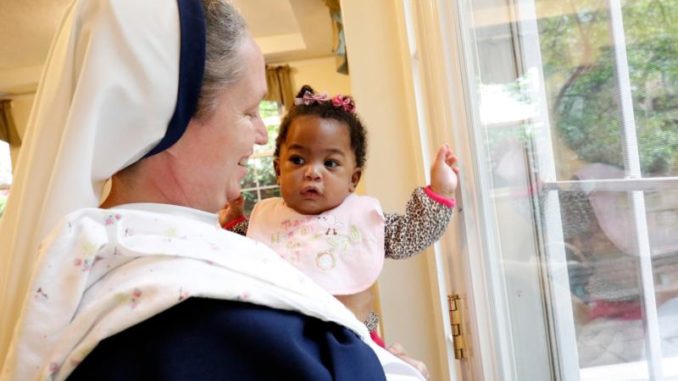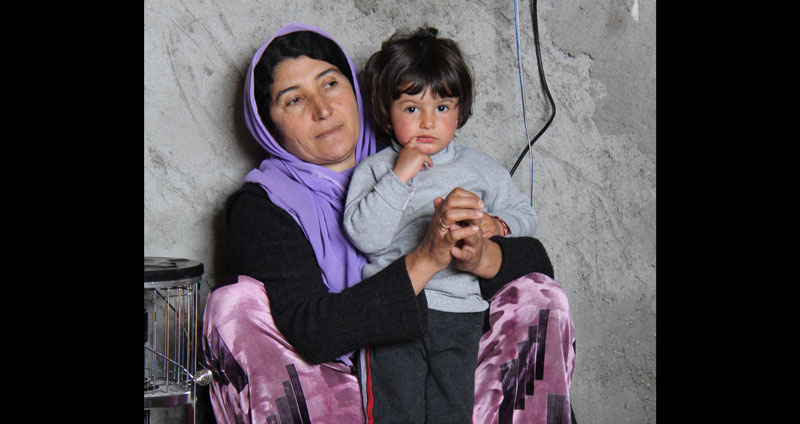
BALTIMORE—Archbishop Joseph F. Naumann, of Kansas City, Kansas, and Chairman of the Committee on Pro-Life Activities for the U.S. Conference of Catholic Bishops, addressed the annual November meeting of bishops about the need for improved pastoral responses to women facing unexpected or challenging pregnancies.
“The challenges can be immense for women in difficult or unplanned pregnancies,” Archbishop Naumann said, noting that 75% of women who choose abortion are low income. “Pregnant and parenting moms in need are in our parishes and our neighborhoods. Women facing challenging pregnancies should see the Church as a place where they can find help, especially with its myriad of social services and organizations dedicated to meeting the needs of people in crisis,” he continued.
In his invitation to the bishops, Archbishop Naumann shared that well over 150,000 low-income mothers deliver their babies at Catholic hospitals each year, and many tens of thousands of pregnant and parenting moms are helped each year through Catholic Charities programs and other help agencies. In addition, thousands of pregnancy care centers staffed by many Catholic volunteers.
Nevertheless, the archbishop noted that there are gaps, and “while many pregnancy help resources are appropriately coordinated at the diocesan or regional level, moms in need are best reached at the local level.”
“We have well over 17,000 parishes in the United States. Each parish is best able to identify the local pregnancy help resources that are currently available and to identify potential gaps that need to be addressed. The parish community is uniquely positioned to encourage a collaboration of resources at the local level and to increase awareness of help available to mothers and families in need,” Archbishop Naumann explained.
To this end, Archbishop Naumann asked the bishops present to invite their parishes to join a nationwide effort from March 25, 2020, to March 25, 2021, entitled: “Walking with Moms in Need: A Year of Service.”
This Year of Service will coincide with the 25th anniversary of Evangelium Vitae (The Gospel of Life), a landmark encyclical by Pope John Paul II. The Pro-Life Committee is developing educational, pastoral, and action-oriented resources for parish use, including reflections on the teachings of Evangelium Vitae, Evangelii Gaudium, and Laudato Si; prayers for building a culture of life; tools for documenting an inventory of local resources for pregnant mothers in need; and ideas and support for improving parish responses.
More information about the initiative can be found at www.usccb.org/moms-in-need
In other news from the Fall General Assembly, the bishops voted on nine action items.
The bishops voted to approve the sixth edition of the “Program of Priestly Formation” for use in the dioceses of the United States with 226 votes in favor, 4 against, and 3 abstentions. The vote required affirmation by two-thirds of the Conference membership and is subject to recognitio by the Vatican Congregation for Clergy.
The Latin Church members of the USCCB voted to approve two translations by the International Commission on English in the Liturgy (ICEL). The first vote on a translation of the Order of Christian Initiation of Adults as the base text for a future edition of this rite in the dioceses of the United States was approved with 217 votes in favor, 3 against, and 3 abstentions. The vote required affirmation by two-thirds of the Latin Church members and is subject to confirmatio and recognitio by the Vatican Congregation for Divine Worship and the Discipline of the Sacraments. The second vote on a translation of the Hymns of the Liturgy of the Hours for use in the dioceses of the United States was approved with 205 votes in favor, 5 against, and 2 abstentions. The vote required affirmation by two-thirds of the Latin Church members and is subject to confirmatio by the Vatican Congregation for Divine Worship and the Discipline of the Sacraments.
In other items the bishops approved:
• A short letter and five short video scripts to supplement Forming Consciences for Faithful Citizenship, the bishops’ teaching document for the faithful on the political responsibility of Catholics. The short letter was approved 207-24 with 5 abstentions; the vote on the video scripts was 227-5 in favor with 4 abstentions.
• In a vote of 220 to 7 with 2 abstentions, the body of bishops voted to approve the Conference’s Subcommittee on Hispanic Affairs to lead the process of developing a new comprehensive vision for Hispanic/Latino ministry in response to the V Encuentro process.
• The bishops voted with 211 in favor, 11 against and 1 abstention of approval of the 2020 proposed budget, presented by the Committee on Budget and Finance.
• The results of the vote by diocesan and eparchial bishops for a 3% increase in the diocesan assessment for 2021, was 111 to 55, which fell short of the necessary majority. Ballots will be mailed to bishops not present in order to have a conclusive vote.
• The full body of bishops also approved the Revised Strategic Priorities for the 2021-24 USCCB Strategic Plan by a vote of 214 to 4 with 2 abstentions.
• By a voice vote of the majority of members present and voting, the bishops also approved to support the request of Cardinal Philippe Barbarin of Lyon asking the Holy Father to name St. Irenaeus a Doctor of the Church.
• The bishops also elected the following members to the Catholic Relief Services Board of Directors: Bishop Frank J. Caggiano of Bridgeport, Bishop Mark J. Seitz of El Paso, and Bishop Anthony B. Taylor of Little Rock.
From the U.S. Conference of Catholic Bishops



